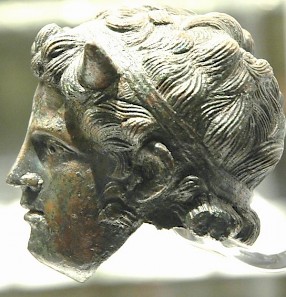Plutarch on Demetrius becoming king of Macedonia

In 298, the ruler of Macedonia, Cassander, died. His two brothers now divided the kingdom: Antipater received the western and Alexander the eastern half. Immediately, they started to quarrel. Alexander felt threatened, and in 294 invited two men to come to his assistance: Demetrius I Poliorcetess and Pyrrhus of Epirus. Pyrrhus was the first to intervene. In 294, he invaded Macedonia and restored the balance of power between the two brothers. He had just left the stage, when Demetrius entered.
The story is told by Plutarch of Chaeronea, Life of Demetrius 36-37. The translation was made by John Nalson and belongs to the Dryden series.
Demetrius becomes king of Macedonia
[36] Fortune opened upon Demetrius a new and wonderful prospect, of the following kind. Cassander, king of Macedonia, had died, and his eldest son Philip, who succeeded him, had not long survived his father. The two younger brothers fell at variance concerning the succession.
When Antipater had murdered his mother Thessalonica, Alexander, the younger brother, called in to his assistance Pyrrhus out of Epirus, and Demetrius out of the Peloponnese.note Pyrrhus arrived first, and, taking in recompense for his succor a large slice of Macedonia,note had made Alexander begin to be aware that he had brought upon himself a dangerous neighbor.
To make sure that he might not run a yet worse hazard from Demetrius, whose power and reputation were so great, the young man hurried to meet him at Dion, where Demetrius had now arrived.. Offering his greetings and grateful acknowledgments, Alexander at the same time informed him that his affairs no longer required the presence of his ally, and invited him to supper.
There were some feelings of suspicion on either side already; and when Demetrius was on his way to the banquet, someone came and told him that in the midst of the drinking he would be killed. Demetrius showed little concern, but, making only a little less haste, ordered the principal officers of his army to draw out the soldiers, and make them stand to their arms, and ordered his retinue (more numerous than that of Alexander) to attend him into the room of the entertainment, and not to go away till they saw him rise from the table.
Alexander's servants, finding themselves overpowered, did not have the courage to attempt anything. As a matter of fact, Demetrius gave them no opportunity, for he made a very short visit, and pretending to Alexander that he was not at present in health for drinking wine, left early.
Next day, he occupied himself in preparations for departing, telling Alexander he had received intelligence that obliged him to leave, begging him to excuse so sudden a parting; he would hope to see him further when his affairs allowed him leisure. Alexander was only too glad, not only because Demetrius was going, but also because he was doing so of his own motion, without any offense. He proposed to accompany him into Thessaly. But when they came to Larissa, new invitations passed between them, new professions of good-will, covering new conspiracies - by which Alexander put himself into the power of Demetrius.
Because he did not like to use precautions on his own part, fearing that Demetrius would take the hint to protect himself more carefully, the very thing he meant to do was first done to him. He accepted an invitation, and came to Demetrius' quarters; and when Demetrius, while they were still supping, rose from the table and went forth, the young man also rose and followed him to the door, where Demetrius, as he passed through, only said to the guards, "Kill the man that follows me" and went on. Alexander was at once dispatched by them, together with friends that endeavored to rescue him. One of them said, before he died: "You have been one day too quick for us."
[37] As may be supposed, the following night was one of disorder and confusion. At dawn, the Macedonians, still in alarm and afraid of the forces of Demetrius, found that no violence was offered. Instead, Demetrius sent a message, desiring an interview and an opportunity for explanation of his actions. The Macedonians now began to feel pretty confident again, and prepared to receive him favorably.
When he arrived, there was no need of much being said; their hatred of Antipater for his murder of his mother, and the absence of any one better to govern them, soon decided them to proclaim Demetrius king of Macedonia. So they at once went to Macedonia and took him with them. The Macedonians at home, who had not forgotten or forgiven the wicked deeds committed by Cassander on the family of Alexander the Great,note were far from sorry at the change. Any kind recollections that still might subsist of the plain and simple rule of the first Antipater went also to the benefit of Demetrius, whose wife was Phila, his daughter, and his sonnote by her, a boy already old enough to be serving in the army with his father, was the natural successor to the government.